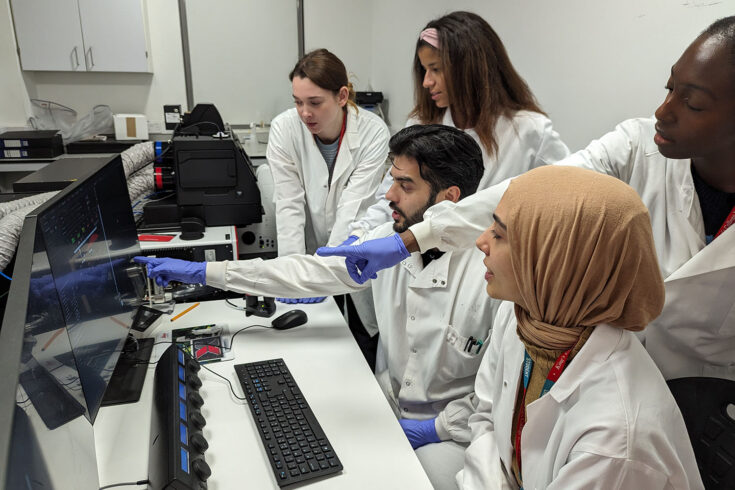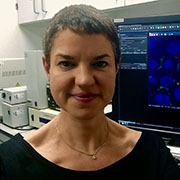We all have to take research culture very seriously, because having a positive and motivating environment is critical for being a successful academic scientist. If we’re not supporting our future generation properly, then we’re going to lose them.
It’s a positive change to be more encouraging of this agenda. So it’s fantastic that there’s a strong focus on developing research culture in the new Medical Research Council Centres of Research Excellence (MRC CoRE). These are major research investments aiming to address critical health research challenges.
Round one is still under way and the first centres will be announced in March 2024. But in preparation for the next round opening in September we have just announced the themes for round two. These cover the fields of ageing, immunology and cancer research.
Support individuals at all career stages
As a member of the MRC Major Investments Board, I reviewed all the applications that came in for the ‘outline stage’ in round one. In addition to the scientific challenge and vision, we had a lot of discussions about research culture and aspects of interdisciplinary working. We feel strongly that these new investments can really benefit individuals and enable inclusive and disruptive thinking that accelerates impactful outcomes.
Research culture has evolved a lot since I started my lab, and particularly over the last decade. It’s critical to support everybody at every career stage in an inclusive and consultative manner, and provide personalised mentoring and training, to realise a better working environment for all research staff. These issues are very close to my own heart, and ones that I’ve pushed hard to implement over the past 15 years.
Have open conversations
When you’re thinking about how to build an MRC CoRE, think about the people and how you’re supporting them. Think how you’re going to mix disciplines together and help to break down language barriers between those disciplines, so everyone can contribute to tackling the research challenge.
In my department at King’s, we’re very social, inclusive and collaborative. The postdocs, students and other research staff talk to each other a lot, and tell us what’s good and what’s bad, and how we can help them. It’s really important that those open, honest conversations happen continuously so we can understand the emerging and evolving needs of all team members and support them appropriately.
Mix up the disciplines
We’re aiming for MRC CoREs to adopt an agile and cross-disciplinary working environment which is something I’m personally really passionate about. Creating that sort of culture generates new opportunities without even having to try and it’s supportive of more innovative and inclusive research. When ideas from different disciplines collide, and everybody’s on the same page, it drives new and exciting avenues that would never have happened otherwise. This includes collaborations with the public; everyone from schoolchildren to patients, their families and local communities play a valuable role in shaping our research.
I have seen huge benefits for my own team in working in this way, and for others who operate similarly. Bringing together different disciplines to address a shared problem in biomedical science is a valuable experience for everyone, and ultimately for the benefit of human health.
My lab are mostly cell biologists, but we operate across different scales, types of technology and disease areas. We are very fortunate to collaborate with a talented and diverse range of scientists, including physicists, engineers, clinicians and computational scientists, and this enhances all our research programmes. I’m not a structural biologist. But I know that if this angle is critical to solving a challenge we’re working on, I can walk down the hall and chat to experts who are delighted to help. This way of working makes you bolder in the way you think, because you can be supported by those individuals. You don’t feel like you have to know everything.
Rise to a challenge
Along with research culture, applications that hit the mark at the outline stage articulated where the knowledge gaps were and the key challenge within this that the team would address. The challenge was specific enough that they could clearly state how they would use the seven-plus-seven-year funding model to address it and create a step change for the field.
Something we thought hard about during our major investment board discussions was how we could enable scientific agility. We want to give the MRC CoRE leadership teams complete flexibility about how they spend the budget because we recognise that the challenges they’re putting forward are complicated.
We anticipate that MRC CoREs will pivot as the field, technology and approaches evolve and change accordingly as new findings and opportunities emerge during the funding period. If your direction changes a bit, you move the money and draw in new talent. We want these major investments to be looking across national and international landscapes. And ensuring they are at the forefront of the challenge area, by working with the right teams at the right time.
Think broadly and reach out to others
Think about the breadth and composition of what you need from day one to address your specific challenge, and think as broadly as you can. Some of the outline applications in round one were very narrow in terms of discipline, and looked quite siloed. We want a diversity of people and ideas to be coming together to bring a different perspective on an existing or a new challenge.
We’re also really interested in multi-institutional bids. We want to be very inclusive and make sure that the best talent and ideas in the UK are being drawn together. I would encourage people in smaller institutions, who don’t necessarily feel like they could be leading an application, to get involved with other groups. Don’t think it’s not for you. We want everybody to be involved and engaged if you think you can contribute.
Reflect and make changes
A positive research culture requires us all to constantly reflect on what a supportive working environment looks like and make changes; it’s an iterative process.
As round one progresses, we will keep reflecting on where we could have helped our researchers more, for example by being clearer on what we’re looking for. All feedback is welcome so we can make changes for future rounds.
Find out more
To share feedback or ask questions contact: core@mrc.ukri.org
The annual MRC CoRE funding opportunity involves a two-stage application process. The first stage is an outline application, the second stage is a full application. Only a small number of applicants will be invited to prepare a full application.
The deadline for submitting outline applications for round two is 7 February 2024. Full details of each theme’s scope will be included when the outline funding opportunity opens on 25 September 2023. Find out how to apply.
If you have questions about MRC Major Investments Board contact: mib@mrc.ukri.org
Learn how UK Research and Innovation supports a healthy research and innovation culture.
Find out how we celebrate the diverse and broad impacts made by our research community through our MRC prize schemes. The new annual MRC Impact Prize recognises individuals and diverse teams that advance open science and team science. It also champions early-career researchers that are trailblazing change across the research culture and the wider research environment.




